Why can't I install wordpress theme?

WordPress theme installation tutorial
Method 1: Enable background direct upload
1. Log in to the WordPress program backend, click "Appearance" - "Theme" in the left menu bar, and then the "Add button" appears on the right theme interface, click to enter the add theme page;
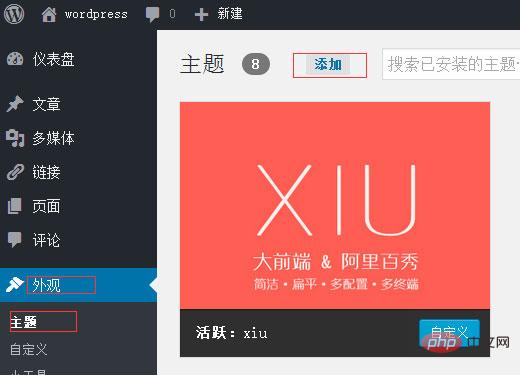
2. Enter the add theme page. There are many default themes to choose from, or you can upload them yourself. This article will upload a theme demonstration. Click "Upload Theme";
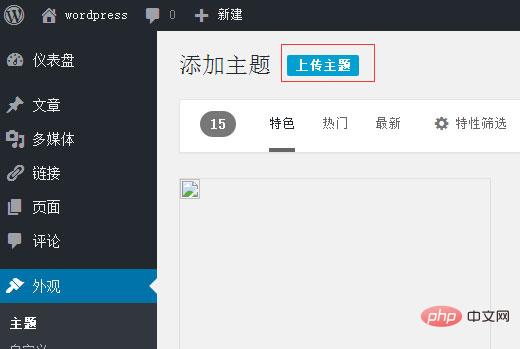
3. Select the local WordPress theme package (usually a compressed package in zip format), and then upload it;
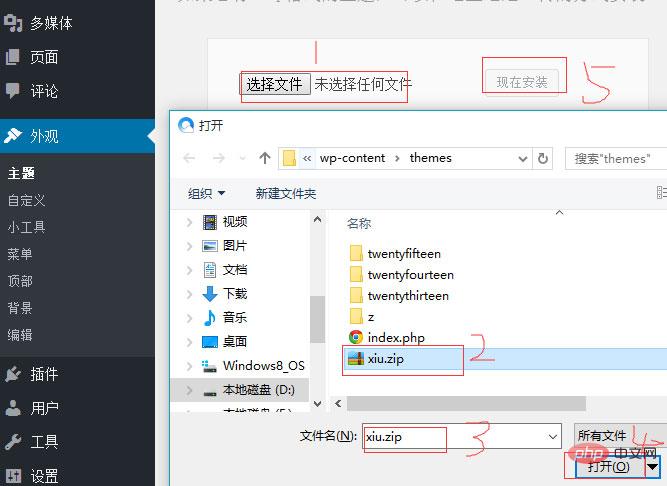
4. Wait for the upload and installation. After the theme is installed successfully, click "Enable" to install the new WordPress theme.
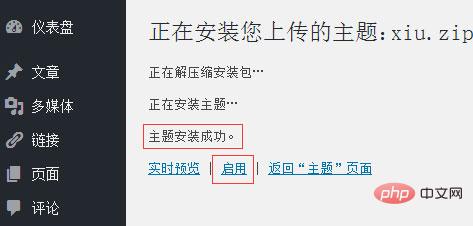
Method 2: Add a theme to the installation directory
1. Enter the WordPress installation directory through the control panel of the website space or the FTP tool. Then find the theme installation path/wp-content/themes, upload the WordPress theme compressed package to this directory and decompress it;
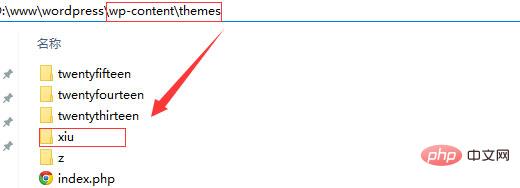
2. Log in to the WordPress backend and click "Appearance" - "Theme", the newly uploaded theme will appear on the right, click "Enable".

Related recommendations: "WordPress Tutorial"
Causes and solutions for failed WordPress theme installation
If it is a complete WordPress theme, there will be no problem if you install it according to the above method, but occasionally friends will encounter the problem of installation failure. The editor has compiled common reasons for failure and solutions:
Problem 1: After installing the theme, the homepage of the website appears blank
Cause analysis: This This problem is usually caused by an error in the WordPress theme, causing the program to terminate execution.
Solution: Enter the WordPress backend and change the theme (if you must use the current theme, first ensure that the theme file is completed and the code is correct).
Problem 2: Installation package compression format
Cause analysis: WordPress theme compression package must be in zip format, other formats may fail to upload and The error message below appears.

#Solution: Make sure the theme is a compressed package in zip format before uploading.
Question 3: The theme is missing style.css
Cause analysis: The most common reason for this problem is that the theme package is not in the root directory , that is, there is still a folder in the compressed package.

Solution: Unzip the downloaded WordPress theme package locally first. If the folder does not look like the picture below when opened, it means that the folder is not Theme root directory. At this time, you need to find the theme root directory folder and compress it before uploading.
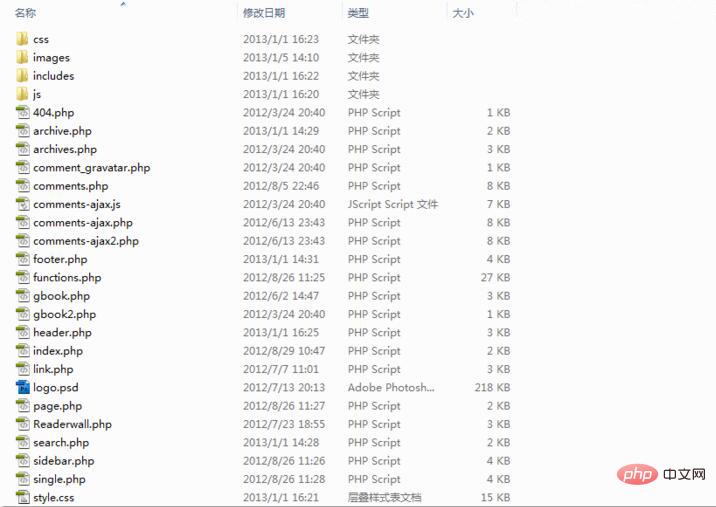
Question 4: 500 error occurs when enabling a new theme
Cause analysis: There are many reasons for this, it may be PHP The version is too low, which may also be caused by installed plug-ins.
Solution:
1. Just switch according to the PHP version supported by the WordPress theme. It is recommended to use the American hosting provider HostEase, which supports almost all PHP versions. Key switch;
2. First disable the installed plug-in, enable the theme and then enable the plug-in or analyze which plug-in is causing the conflict.
The above is the detailed content of Why can't I install wordpress theme?. For more information, please follow other related articles on the PHP Chinese website!

Hot AI Tools

Undresser.AI Undress
AI-powered app for creating realistic nude photos

AI Clothes Remover
Online AI tool for removing clothes from photos.

Undress AI Tool
Undress images for free

Clothoff.io
AI clothes remover

Video Face Swap
Swap faces in any video effortlessly with our completely free AI face swap tool!

Hot Article

Hot Tools

Notepad++7.3.1
Easy-to-use and free code editor

SublimeText3 Chinese version
Chinese version, very easy to use

Zend Studio 13.0.1
Powerful PHP integrated development environment

Dreamweaver CS6
Visual web development tools

SublimeText3 Mac version
God-level code editing software (SublimeText3)

Hot Topics
 1664
1664
 14
14
 1423
1423
 52
52
 1317
1317
 25
25
 1268
1268
 29
29
 1242
1242
 24
24
 How to adjust the wordpress article list
Apr 20, 2025 am 10:48 AM
How to adjust the wordpress article list
Apr 20, 2025 am 10:48 AM
There are four ways to adjust the WordPress article list: use theme options, use plugins (such as Post Types Order, WP Post List, Boxy Stuff), use code (add settings in the functions.php file), or modify the WordPress database directly.
 How to build a website for wordpress host
Apr 20, 2025 am 11:12 AM
How to build a website for wordpress host
Apr 20, 2025 am 11:12 AM
To build a website using WordPress hosting, you need to: select a reliable hosting provider. Buy a domain name. Set up a WordPress hosting account. Select a topic. Add pages and articles. Install the plug-in. Customize your website. Publish your website.
 How to change the head image of the wordpress theme
Apr 20, 2025 am 10:00 AM
How to change the head image of the wordpress theme
Apr 20, 2025 am 10:00 AM
A step-by-step guide to replacing a header image of WordPress: Log in to the WordPress dashboard and navigate to Appearance >Theme. Select the topic you want to edit and click Customize. Open the Theme Options panel and look for the Site Header or Header Image options. Click the Select Image button and upload a new head image. Crop the image and click Save and Crop. Click the Save and Publish button to update the changes.
 What are the plugins for wordpress blocking ip
Apr 20, 2025 am 08:27 AM
What are the plugins for wordpress blocking ip
Apr 20, 2025 am 08:27 AM
WordPress IP blocking plugin selection is crucial. The following types can be considered: based on .htaccess: efficient, but complex operation; database operation: flexible, but low efficiency; firewall: high security performance, but complex configuration; self-written: highest control, but requires more technical level.
 How to view the front-end of WordPress
Apr 20, 2025 am 10:30 AM
How to view the front-end of WordPress
Apr 20, 2025 am 10:30 AM
You can view the WordPress front-end by logging into the dashboard and switching to the View Sites tab; automate the viewing process with a headless browser; installing the WordPress plugin to preview the front-end within the dashboard; viewing the front-end via a local URL (if WordPress is set locally).
 How to import the source code of wordpress
Apr 20, 2025 am 11:24 AM
How to import the source code of wordpress
Apr 20, 2025 am 11:24 AM
Importing WordPress source code requires the following steps: Create a sub-theme for theme modification. Import the source code and overwrite the files in the sub-topic. Activate the sub-theme to make it effective. Test the changes to make sure everything works.
 How to cancel the editing date of wordpress
Apr 20, 2025 am 10:54 AM
How to cancel the editing date of wordpress
Apr 20, 2025 am 10:54 AM
WordPress editing dates can be canceled in three ways: 1. Install the Enable Post Date Disable plug-in; 2. Add code in the functions.php file; 3. Manually edit the post_modified column in the wp_posts table.
 How to write a header of a wordpress
Apr 20, 2025 pm 12:09 PM
How to write a header of a wordpress
Apr 20, 2025 pm 12:09 PM
The steps to create a custom header in WordPress are as follows: Edit the theme file "header.php". Add your website name and description. Create a navigation menu. Add a search bar. Save changes and view your custom header.




